I almost forgot: the Inner Drive demonstration site, Weather Now, got a significant upgrade this weekend, to version 3.6. I added two new features that are part of long-term plan of improvements. They don't sound like much, but they're pretty important bits that other features will depend on.
First, the lists of weather stations that appear on the home page are now generated dynamically from a database table. This means that I can change them, remove them, add them, or schedule them without having to make code changes. For example, during NFL Football season, you'll notice a list of home football games that changes every Tuesday at midnight Eastern time. In the past, to add a list like that, I'd have to make code and configuration changes. Now I don't.
Now the cool part, and how this is just a step towards a larger feature: In version 3.7 (coming out in January, I hope), you, dear user, will be able to create your own lists.
Second, I've added caching to the current weather reports. Before, every page view required multiple round-trips to the weather database. Now, any time the site retrieves current weather from the database, it stores the reports for some length of time. Any subsequent page requests will find the weather reports in the cache. This means the home page loads significantly (10x) faster on most views. The site gets about 11,000 page views every day, so this is non-trivial.
The cache right now has a fixed expiration time of 180 seconds, and I can change that through the standard application configuration tools. By "fixed" I mean the cache will discard all reports older than three minutes, forcing the application to refresh those reports from the database. This strikes a good balance between current data and application speed, I think, especially since the National Weather Service (whence comes the data) has new information at about that frequency. (You can read more about how caching works in the Inner Drive Extensible Architecture™ SDK.)
I think these are really cool changes, and I'm excited about how much it moves me down the roadmap. And the 3.7 update will be even cooler.
Ah, how lovely to be at the beach in Chicago tonight. Just look at it:

Oh, just kidding. That's actually Miami Beach at sunrise in January 2007. This is what Lake Michigan looked like this evening:
The video's resolution isn't high enough to show the snowflakes proceeding in a generally horizontal fashion to the south. Nor does it show my dog, who couldn't decide whether all that snow and water was freaky or fun. (He ultimately decided the water was freaky, the snow was fun, and getting toweled off feels great.)
In Chicago, we get about 10 days a year like this against about 20 leave-work-early-it's-too-gorgeous-out days:
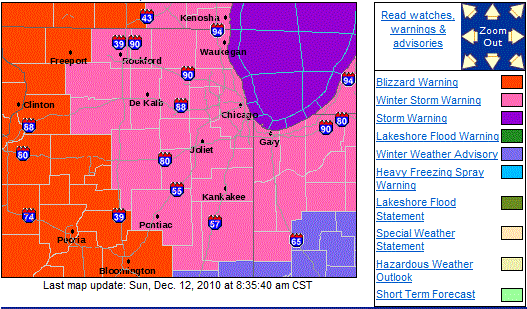
Current conditions at Inner Drive Technology World Headquarters: 1°C, winds from the north at 46 km/h gusting to
57 km/h, with snow. Oh, it gets better, according to the National Weather Service:
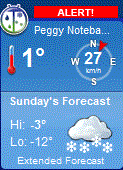 Today: Snow and areas of blowing snow. Temperature falling to around -4°C by 5pm. Very windy, with a north wind between 45 and 65 km/h, with gusts as high as 90 km/h. Chance of precipitation is 100%. Total daytime snow accumulation of 4 to 8 cm possible.
Today: Snow and areas of blowing snow. Temperature falling to around -4°C by 5pm. Very windy, with a north wind between 45 and 65 km/h, with gusts as high as 90 km/h. Chance of precipitation is 100%. Total daytime snow accumulation of 4 to 8 cm possible.
Tonight: Snow and areas of blowing snow before midnight, then areas of blowing snow and a slight chance of snow after midnight. Low around -12°C. Wind chill values as low as -22°C. Very windy, with a north northwest wind between 50 and 65 km/h, with gusts as high as 80 km/h. Chance of precipitation is 80%. New snow accumulation of less than one centimeter possible.
Again, though, I have to remind my fellow Chicagoans: for every day we get like this, we get two or three where you don't want to go back inside.
Lincoln Park, Chicago, this morning:
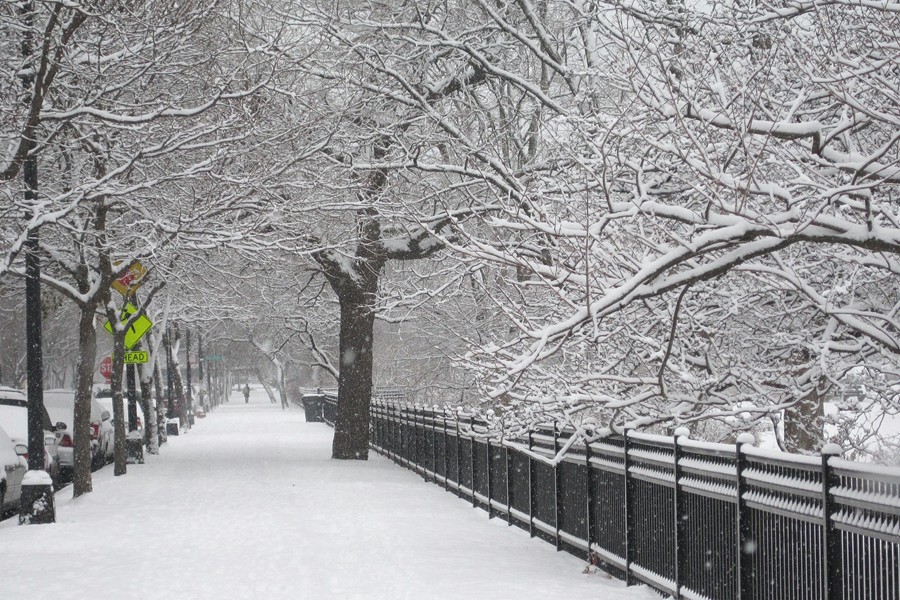
Parker hasn't gotten to play in this yet because I had an 8am class, but as soon as that's over we'll hit the park. Welcome to winter:
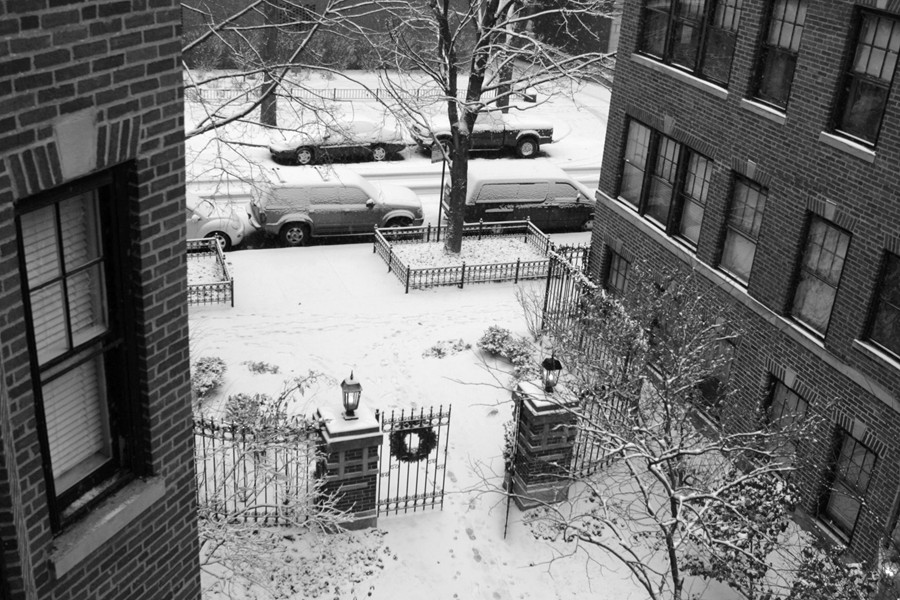
Guys are installing new windows at IDTWHQ, completing the project begun in March 2009. (I split it into two phases to spread the cost over two years.) I ordered this set mid-August. We thought they'd be done in October, but no such luck.
Here's the effect, according to the Inner Drive Technology International Data Center Monitor:
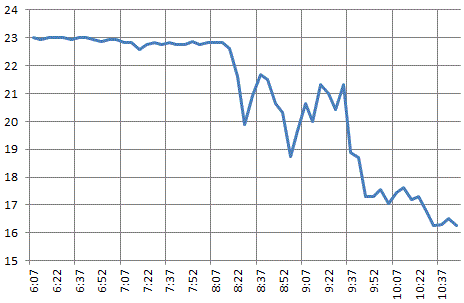
The bottom axis shows local time, the vertical shows degrees Celsius. Also keep in mind that servers produce heat, so the server rack usually runs about 2°C warmer than the rest of the apar—World Headquarters. And for those keeping score at home, right now it's -1°C outside.
I'll have more art later in the day.
Remember that bit about our unusually warm autumn? Meteorological winter began yesterday, leaving no doubt of its arrival:
Chicagoans shivered through the coldest December open in 27 years Wednesday. The day's biting 48 to 56 km/h gusts generated wind chills which ranged from single digits to the mid teens [Fahrenheit] as bursts of snowfall dusted the ground and produced the city's first measurable (3 mm) accumulations at Midway and O'Hare. The snowfall generated patches of black ice which led to a number of traffic accidents on I-65 while wrecks forced state police to close of sections of I-69 north of Indianapolis for a time.
Wednesday's -3°C high was not only the coldest to occur this fall, it was 7°C below normal and nearly 16°C colder than the month's 13°C open a year ago. Not since the -4°C high Dec. 1, 1983 has a December opened any colder here. It's interesting to note that the month which followed produced a -32°C Christmas Eve low temperature.
Over at Inner Drive Technology WHQ, we'll get to experience the cold weather in an extra-special way when guys come to replace half of our windows. They were scheduled to do it back in October, but, wouldn't you know, they were waiting on their suppliers...
The Chicago Tribune reported this morning that average Chicago temperatures have remained above normal month by month for the past nine in a row:
The temperature trend to date may be among the most remarkable on record for the period here. November 2010 is to become the ninth consecutive month to close with a temperature which has averaged warmer than normal. That's a nearly unprecedented accomplishment. It means meteorological spring (March through May), meteorological summer (June through August) and meteorological autumn (September through November) have each finished above normal. An in-house analysis of Chicago's seasonal temperatures indicates there have only been two instances since Midway Airport observations began in 1928--the years 1998 and 1999--in which spring, summer and autumn have ALL been above normal--including each of their constituent months!
The report also mentions we've had the sunniest autumn in 11 years.
Of course, it's almost December, which means relative warmth can still mean absolute misery. Alaska has sent us a storm which should arrive Saturday morning, bringing the first significant snowfall of the year.
My demo site, Weather Now, has a feature showing weather extremes for the world. Northwest Canada right now is having unusually cold weather. What's the connection? The Calgary Herald published a story about the website yesterday and syndicated it across Canada. Jenna McMurray of the Calgary Sun also picked up the story, and called me for a quick interview.
As a result, Weather Now went from a daily average 4,000 page views up to a server-smashing 337,000 yesterday. It seems traffic has tapered off a bit today, but I'm still getting enormously more hits than usual.
I'm also getting a lot more feedback, like this note from Judy C., who had a Canadian IP address:
Get your facts straight. You and others in your country love to make statements based on minimum research and not double checking what you "think" is correct! Calgary: 2nd coldest place on earth is just as
stupid a comment as other comments on your home page: the world (just the US)! Good grief, no wonder the rest of world laughs at you behind your back.
It took me a few seconds to work out the "just the US" part, but apparently she referred to the link of "coldest places" that filters for just U.S.-based weather reports.
Otherwise, here follows my reply:
Judy,
Thanks for writing.
The site is a programming demo, not a commercial website. As such we only get free information from U.S. government computers. We have no control over the quality or quantity of information that foreign governments make available to the U.S. National Oceanic and Atmospheric Administration, nor do we have any control over what NOAA makes available to us.
The difficulty our site faces is that Environment Canada and similar agencies in other Commonweath nations retain Crown copyright over most of the data that we would want on our site. EC only makes data available for about 100 stations in Canada. So even though it got down to -35C in parts of Alberta Monday night, the only stations we had available in the affected region were two near Calgary, which only got to -30C. As it turns out, northern Alberta briefly got colder (-39C) than Antarctica (-38C), and was, as far as anyone knows, the coldest place on earth.
The site automatically produces the lists of hottest and coldest places every 20 mintues without human intervention. All these facts conspire to produce some odd results from time to time, particularly during severe weather events such as the one Canada is experiencing in Alberta, Saskatchewan, and the Northwest Territories right now.
As for the rest, I assure you the world laughs at us to our faces, not behind out backs. We have a reputation for being rude, thoughtless, and belligerent that other people--for example, Canadians--do not. It occasionally makes polite discourse difficult, as people sometimes assume the worst motivations on the basis of the most banal facts.
Thank you again for your note.
She thanked me for my considered reply. Aww.
It's getting on toward 7:30 in Chicago, and the sun still hasn't risen yet. We return to standard time tonight, meaning the sun will rise at 6:30 tomorrow. Today, however, will be the latest sunrise in Chicago (and in the rest of those parts of the U.S. that observe daylight saving time) until 2021.
What's wrong with the last weekend in October? Or, as they do in parts of Europe, the last weekend in September? The "extra" hour of daylight in the evening has to come from somewhere. I, for one, prefer staying out after dark to waking up before dawn.